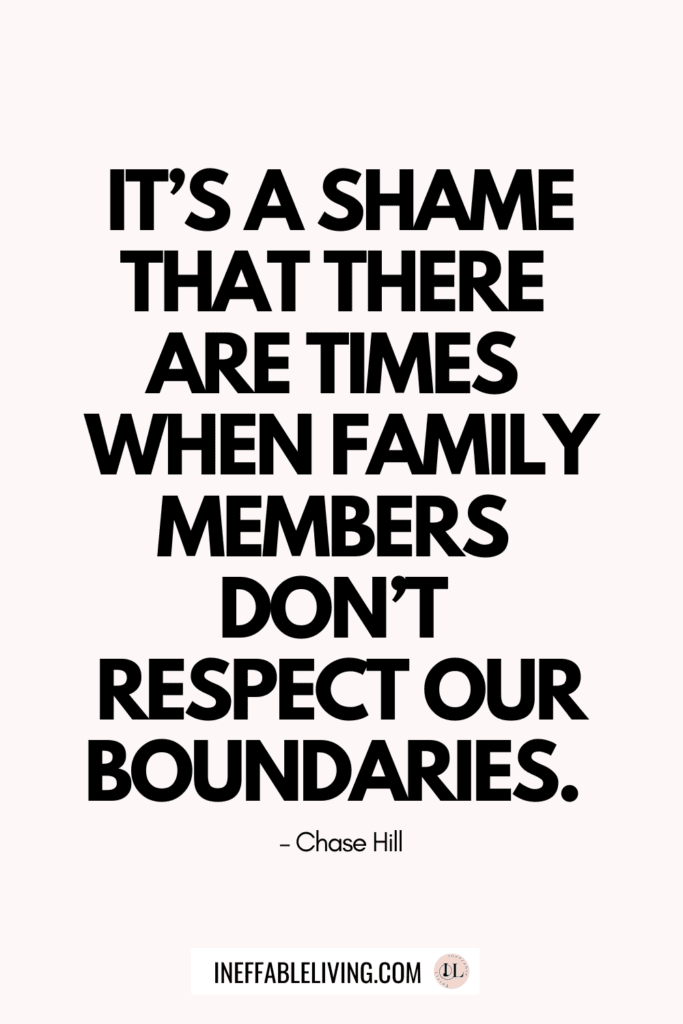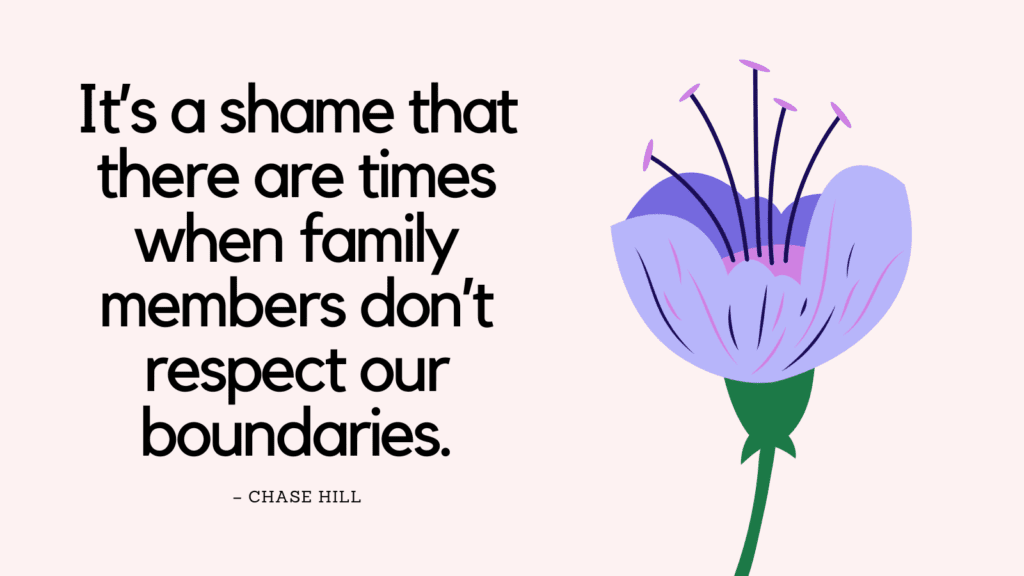This post contains some of the best family boundaries quotes.
Family Boundaries Quotes
1. “Tell them that you love them, and you want them in your life, but not as the relationship is now. Paint a positive picture of the relationship with clear boundaries so that they can completely understand your reasons.” – Chase Hill
2. “When siblings continue to break boundaries, you will need to have a more serious conversation. It might be that they weren’t listening the first time around, or that they didn’t feel that you were serious enough.” – Chase Hill
3. “A good way to start looking at what boundaries to set is to create two lists: one for what you need, and another for what the family needs.” – Chase Hill
4. “It’s a shame that there are times when family members don’t respect our boundaries.” – Chase Hill
5. “If a family member insists on crossing the limits you’ve clearly set, it’s time to create that space for your own wellbeing. It doesn’t have to be forever. But if they aren’t willing to understand the importance of your needs, happiness and life, you’re better off removing them from the equation so that you can look after yourself.” – Chase Hill
Related: Healthy Boundaries Quiz (+Free Pdf Worksheets)
6. “A parent who is authoritative is one who actively listens to their child without dismissing thoughts, feelings and ideas. At the same time as respecting a child for who they are, an authoritative parent will set and maintain boundaries. They will understand the importance of give and take with a child, instead of setting rules that can never be broken.” – Chase Hill
7. “A child expressing anger should be allowed to explain how they feel. But if they throw something in a rage or become physically violent, there has to be a consequence.” – Chase Hill
8. “When looking at establishing boundaries with different family members, begin by making sure you’re clear of what these boundaries look like and if there’s room for give and take, depending on your relationship and their expectations. Prepare yourself so that you’re in the right frame of mind and are feeling as confident as possible.” – Chase Hill
9. “As older people, parents are often stuck in their ways. You might find that they’re also from a generation of authoritarian parents, where there was no other choice but to listen to and obey the rules of the parents. If your parents never set boundaries with their parents, it could be harder for you.” – Chase Hill
Related: Top 25 Tips On How To Set Boundaries In A Toxic Relationship? (+FREE Worksheets PDF)
10. “Also, many times, parents are completely unaware that their actions are upsetting you. By now you have probably tried having a conversation, but your parents continue to break your boundaries.” – Chase Hill
11. “Just because they’re your parents, it doesn’t mean you should give up on your boundaries and accept that this is how life is going to be.” – Chase Hill
12. “Nobody but you knows how you feel, what boundaries you want to set, or the type of relationship you hope to get out of it.”– Chase Hill
13. “Keep telling yourself that you aren’t a child anymore, and that you are an independent human being who deserves respect from everyone, including your parents.”– Chase Hill
14. “What’s equally important as establishing boundaries with your parents is to follow through with the consequences. Empty promises will only encourage parents to cross other lines.”– Chase Hill

15. “Establishing boundaries with your parents isn’t a competition, but you can feel slightly outnumbered if you’re planning to have a conversation with two people on your own.”– Chase Hill
Related: Best +35 People Pleaser Quotes To Help You Let Go Of People Pleasing
16. “Cultural differences can be extremely challenging, but that’s not to say that you don’t have the right to establish your boundaries as you see fit. For those who come from a culture where close relationships and intrusive behavior are part of the norm, it’s hard to see your friends enjoy a more relaxed and less controlling relationship with their parents.”– Chase Hill
17. “If you’ve tried to implement boundaries and your parents aren’t making any effort to change, or you’ve reached the point where you mentally can’t take any more, it’s time to step away and limit the contact as much as possible.”– Chase Hill
18. “Some parents will learn very quickly that you’re determined to maintain your boundaries. Others will test the limits you have in place in the hope they’re able to find your weak spot and regain their control, which is why persistence and determination are critical.”– Chase Hill
19. “As with boundaries and our family members, there’s a wide spectrum with regards to the need for boundaries. There could be niggly things that cause arguments or more severe issues such as narcissism, codependency, and abuse.”– Chase Hill
Related: People Pleaser Quiz (+Top 21 Proven Ways to Stop People Pleasing)
20. “Families living in dysfunction seldom have healthy boundaries. Dysfunctional families have trouble knowing where they stop and others begin.” – David W. Earle
21. “Daring to set boundaries is about having the courage to love ourselves, even when we risk disappointing others.” – Brené Brown
22. “Setting emotional boundaries prevent people from manipulating you, using you, and playing with your feelings.” – Remez Sasson
23. “Boundaries are, in simple terms, the recognition of personal space.” – Asa Don Brown
24. “Setting boundaries is your responsibility. People will continue to do what you allow. You get to decide what is and what isn’t allowed in your life.” – Unknown
25. “If you’re offended by my boundaries, then you’re probably one of the reasons I need them.” – Steve Maraboli
Related: Fear of Disappointing Others: Top 10 Ways to Overcome it
26. “The only people who get upset about you setting boundaries are the ones who were benefiting from you having none.” – Unknown
27. “Setting boundaries is a way of caring for myself. It doesn’t make me mean, selfish, or uncaring just because I don’t do things your way. I care about me, too.” – Christine Morgan
28. “Emotional self-defense… When you set healthier relationship standards in your life, some people will take it personally. That’s their issue, not yours. The distance isn’t against them; it’s for you. It’s a boundary, not a grudge.” – Steve Maraboli
29. “Poisonous relationships cloud your vision. I wasted a lot of time adjusting my personal boundaries and justifying disrespect when it would have been so much easier (and a lot less painful) to simply adjust my life to their absence.” – Steve Maraboli
30. “Boundaries were necessary for a successful relationship. Most relationships aborted in the boundary defining stage. Not because people demanded what they needed. But because they didn’t, then got resentful about it.” – Karen Marie Moning
31. “The hardest part about setting boundaries with people, no matter who they are, is not feeling confident in our authority to do so. As long as you realize that setting boundaries is necessary for healthy relationships, you will feel better defining and keeping them.” – Tamera Mowry-Housley
Related: Top 7 Signs People Pleasing Is a Trauma Response
32. “Boundaries are a part of self-care. They are healthy, normal, and necessary.” – Doreen Virtue
33. “People who violate or cross your boundaries by being cruel, insensitive, thoughtless, abusive, rude or disrespectful should not be a part of your life. You deserve love, dignity and respect. People who willingly and knowingly cross boundaries have mental issues that need to be dealt with.” – Unknown
34. “Having healthy boundaries not only requires being able to say “no”, but also being willing and able to enforce that “no” when necessary.” – Jessica Moore
35. “Honoring your own boundaries is the clearest message to others to honor them, too.” – Gina Greenlee

Examples of Family Boundaries
1. Personal Space and Privacy
– Establishing boundaries around personal space within the household, such as respecting closed doors or designated areas as private.
– Requesting permission before entering someone’s room or using their personal belongings.
– Keeping confidential information shared within the family, without sharing it with others outside the family.
2. Emotional Boundaries
– Defining limits on discussing sensitive topics or avoiding discussions that may lead to conflict or emotional distress.
– Requesting that family members avoid making hurtful or disrespectful comments.
– Setting boundaries around personal emotions, allowing individuals the freedom to experience and express their feelings without judgment or interference.
3. Time and Availability
– Communicating individual schedules and commitments to ensure everyone has dedicated time for personal activities or responsibilities.
– Requesting advance notice or scheduling for visits or gatherings to respect individual family members’ availability.
– Setting boundaries around excessive interruptions or disruptions during work, study, or personal time.
4. Financial Boundaries
– Defining boundaries regarding individual financial responsibilities, such as sharing expenses or managing personal finances.
– Establishing limits on financial assistance or borrowing within the family, ensuring everyone maintains personal financial independence.
– Discussing and setting expectations around financial support for adult children or elderly parents, balancing mutual responsibilities.
5. Communication Boundaries
– Expressing the need for open and respectful communication, while establishing boundaries around yelling, name-calling, or other forms of verbal abuse.
– Requesting that family members actively listen and validate each other’s perspectives without interrupting or dismissing their feelings.
– Setting boundaries around gossiping or sharing personal information without consent.
Remember, these are just a few examples, and boundaries can vary greatly depending on individual preferences, cultural backgrounds, and family dynamics.
Related: What Do Boundaries Sound Like? + 35 Boundaries Examples
How to Establish Boundaries with Family Members?
Establishing boundaries within family dynamics can be a delicate task, as familial relationships often involve complex emotions and histories.
However, setting clear boundaries is essential for maintaining healthy and fulfilling connections.
1. Understand the Importance of Boundaries
Recognize your own needs and limitations by engaging in self-reflection.
Understand that boundaries protect your emotional, physical, and mental well-being, allowing you to maintain healthy relationships with family members.
Emphasize that boundaries are not meant to create distance or disconnect.
Instead, they promote respect, open communication, and healthier interactions, strengthening the overall family dynamic.
Related: Boundaries vs Ultimatum
2. Clearly Communicate Boundaries
Use “I” statements to express your boundaries, making it clear that your decision arises from personal needs and values.
Be respectful but firm, avoiding blame or criticism.
Encourage family members to share their feelings and perspectives regarding boundaries.
Actively listen to their concerns, validating their emotions while reinforcing your own limits.
3. Consistency is Key
Once boundaries are established, enforce them consistently.
Avoid making exceptions or allowing boundary violations, as this can confuse family members and undermine the efficacy of the boundaries.
Clearly communicate the consequences of violating boundaries and follow through when necessary.
Consistency and accountability help establish respect for your boundaries within the family unit.
Related: Top 35 Boundaries Affirmations To Help You Become More Assertive
4. Flexibility and Compromise
Assess which boundaries are flexible and which should remain non-negotiable.
Recognize that some boundaries may require flexibility to accommodate unique family circumstances or events.
Engage in open dialogue, seeking compromises that respect both your boundaries and the needs of other family members.
Collaboration fosters understanding and enhances mutual respect.
Related: +100 Examples of Boundary Violations & How to Deal With It
5. Seek Support
If navigating boundaries within your family becomes challenging, consider seeking support from a therapist or counselor specializing in family dynamics.
They can provide expert advice and facilitate productive discussions.
Connect with friends or support groups who may have faced similar challenges.
Sharing experiences and finding solidarity can help reduce feelings of isolation and provide valuable insight.
6. Practice Self-Care
Establishing boundaries requires emotional energy.
Prioritize self-care activities such as exercise, meditation, and pursuing hobbies to recharge and maintain your own well-being.
Related: Best 100 Self Care Affirmations To Honor Yourself

Conclusion
Establishing boundaries with family members is crucial for maintaining healthy and fulfilling relationships.
By understanding the importance of boundaries, effectively communicating them, maintaining consistency, being flexible when appropriate, seeking support when needed, and prioritizing self-care, you can nurture healthy boundaries within your family.
Remember, healthy boundaries contribute to enhanced emotional well-being and foster positive connections with your loved ones.
References
- Portions of this article were adapted from the book Healthy Boundaries, © 2021 by Chase Hill. All rights reserved.



